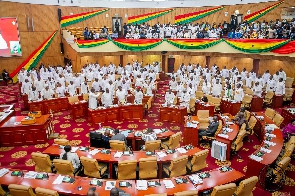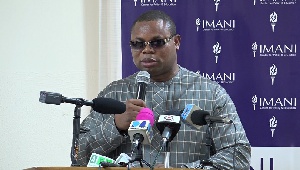While the Speaker of Parliament has every right to voice out his opinion in the Dr Cassiel Ato Forson’s trial, it is wrong in my humble opinion to create the false impression that the Minority Leader is being persecuted for standing trial for allegedly causing willfull financial loss to the state.
Mr Bagbin is said to have poured his heart out during a visit to the spouse and family of the late former Majority leader, Felix Kwasi Owusu-Agyapong: “The Minority Leader, unfortunately, is being persecuted, so on a number of these occasions, he can't be with us because he is appearing in court, as of now, he is in court being trial. It is not that we don't want the rule of law to apply; we all want it to apply, but where prosecution is just a gamble, 'I may win or I may not win, but let me do it,' I will not prescribe that for any politician because as a leader, you always have to take the risk. You could get it right; you could get it catastrophically wrong"(ghanaweb.com, 20/10/2023).
With all due respect, Mr Speaker, we are all equal before the law, so why must a section of society have some kind of immunity in the justice delivery?
Unfortunately, Ghana’s justice system tends to clampdown heavily on the goat, cassava and plantain thieves, and more often than not, let go the obdurate criminals who hide behind the narrow political colorations.
Frankly stating, much as the controversial parliamentary concession was inserted in the constitution so as to remedy needless obstructions and to allow the parliamentarians to go about their duties seamlessly, the provision somehow gives a section of the population an unfettered freedom.
Of course, we acknowledge wholeheartedly the important role our representatives in parliament are playing in the nation building.
But the all-important question we should be asking is: is their role more important than that of a farmer, a teacher, a doctor among others?
Interestingly, the proponents of the antiquated parliamentary concession contend that without the immunity, the parliamentarians may be prevented from their important duties through suppositious civil and criminal law suits.
Indeed, it is not out of place to protect the policy makers. However, my bone of contention is that the parliamentarians are not the only relevant actors in the nation building who must have special protection in their line of duty.
For argument sake, if the law can excuse a suspected parliamentarian from arrest on his/her way to work, whilst at work or on his/her way back from work, the law might as well make room for the equally important contributors such as farmers, teachers, doctors among others.
Why must we allow a section of the population to perpetrate criminalities and then hide behind the law?
We should, however, not lose sight of the fact that the parliamentary privilege was never intended to help parliamentarians escape the criminal law, but it was rather inserted in the constitution to give parliamentarians immunity against needless civil suits for defamation whilst undertaking their parliamentary duties.
It is important to note that the provision was taken from the British parliamentary privilege and transposed and given meaning in our constitution.
The crucial question then is: do the originators of the controversial provision still find it prudent and expedient?
Interestingly, a few years ago, three Labour MPs in the United Kingdom were charged with false accounting over their parliamentary expenses claims.
However, they deny the offences and tried to avoid a criminal trial by invoking the 1689 Bill of Rights which gives oxygen to parliamentary privilege.
Suffice it to stress that the parliamentary privilege stops MPs and peers from being sued for defamation. So how on earth then would the MPs try to invoke parliamentary privilege in criminal prosecutions under the Theft Act?
But despite their earlier refuge in the parliamentary privilege, the judge found them guilty and sentenced them into prison. Their sentences ranged from 12 months to 18 months.
It is worth pointing out that the modern understanding of parliamentary privilege relates to immunity from litigation for words spoken in the House of Commons.
And more so it has a wider historical meaning, encapsulated in the evolution of British constitution which can be open to legal interpretation.
Of course, it is somewhat prudent to protect parliamentarians whilst going through their normal day-to-day activities at the Parliament.
A few years ago, the MP, Damian Green, was arrested by the London Metropolitan Police at his constituency home on suspicion of "aiding and abetting misconduct in public office" and "conspiring to commit misconduct in a public office".
However, after the MP Damian’s arrest in December 2008, the Speaker of Parliament back then, Michael Martin, explained his actions to the Commons, telling MPs that parliamentary privilege has never prevented the operation of the criminal law.
He alluded to the Joint Committee on Parliamentary Privilege which in its report in 1999, said that the precincts of the House are not and should not be "a haven from the law (Source: independent.co.uk).”
We should not lose sight of the fact that in most jurisdictions, the laws are administered equitably. Indeed, everyone could face the laws without any recourse to their status in society.
Take, for example, a few years ago, the Pakistani Prime Minister, Nawaz Sharif, was forced to resign following his disqualification from office by the country’s top court.
The Supreme Court of Pakistan dismissed Mr Sharif after a damning corruption probe into his family wealth.
The investigative panel claimed his family was unable to account for its vast wealth, leading to the court to order a criminal investigation (guardian.co.uk, 28/07/2017).
In another instance, former Brazilian president, Luiz Inacio Lula Da Silva, who had been cited as the most famous president in Brazil’s contemporary history, was sentenced to nine years and six months in jail after being found guilty on corruption and money-laundering charges (Source: guardian.co.uk, 12/07/2017).
What is more, the controversial South Korean president, Park Geun-hye, found herself in a wide-ranging corruption and cronyism scandal, which culminated in her removal from office in March 2017.
President Park Geun-hye and her long- time confidante, Choi Soon-sil, were accused of conspiring to pressure companies, including Samsung, to donate large sums of money to two non-profit foundations set up by Choi.
Choi was accused of using the money for personal gain, which she denied. However President Park admitted behaving “naively”, but denied coercing companies.
President Park was also accused of giving Choi an unlawful access to state affairs and allowing her to influence policy, including Seoul’s stance on North Korea’s nuclear weapons programme (The Guardian 2017).
In sum, the parliamentary privilege is archaic and inequitable. So let us do away with it. Let us amend or expunge the seemingly irrational provision and replace it with innovative and expedient law.
K. Badu, UK.
k.badu2011@gmail.com
Opinions of Saturday, 21 October 2023
Columnist: Kwaku Badu















